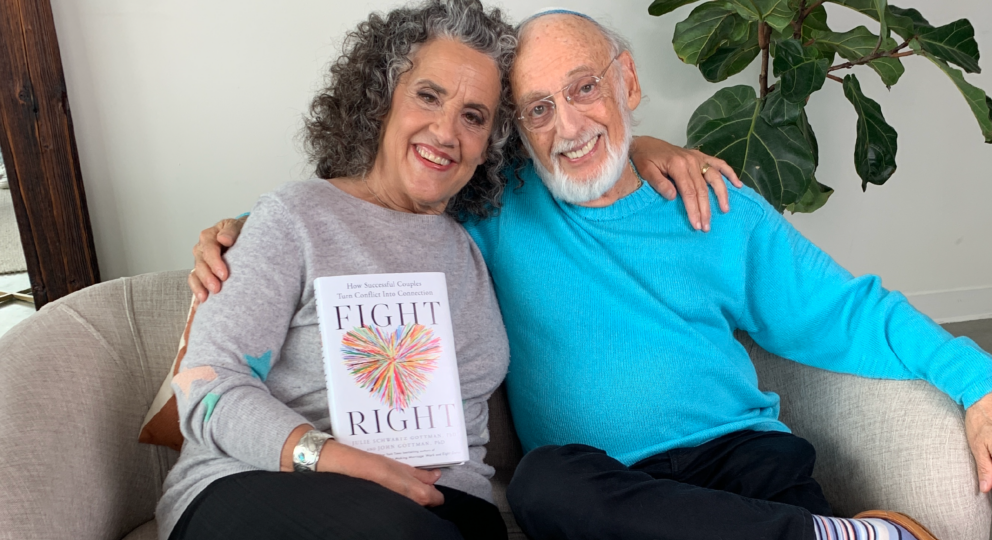Remember the poster with an adorable cartoon couple and the caption, “Love means never having to say you’re sorry?”
Puh-leese!
In my clinical opinion, the creator of that slogan ended up desolate and divorced. He or she was fifty shades of wrong. I’d say—and research clearly shows—that love means saying “I’m sorry” a lot.
And while “I’m sorry” is a good start, I argue that it is not enough. Let’s look at it this way. Say you accidentally spill a glass of lemonade all over the table and thoroughly splash your sweetheart. Then you say, “I’m sorry.”
Are you done?
Of course not. You will go on to clean up the mess so you can begin fresh. What’s more, if the two of you are in this together, your mate will gamely lend a hand to repair the mistake with you.
What if we apply this to arguments, harsh words, or thoughtless actions? What if we make an agreement to clean up our marital messes together, regardless of who spilled the lemonade?
One of the skills I teach the couples in my online program (admittedly a skill I need to use far too often in my own relationship) is the art of the mindful apology.
We will all fall off the rails sometime, but it is what we do to get back on track that matters.
That’s why I teach couples to apologize in a three-step process.
- Apologize
- Forgive
- Begin Again
This is a process of compassionate communication that takes two of you, not just the one who messed up. Watch this video for more.
As you see, it takes two to tango, and therefore it takes two to redo the botched dance steps. To give or receive a good apology is an art, and a great apology involves both of you.
In compassionate communication, there is the giver and the receiver.
The giver knows “I’ve hurt you, I realize it. As the offender, I offer you my repair.”
The receiver sees their beloved struggle and realizes how important it is to hear the apology and accept it with love.
Both the offender and the offended bear responsibility for their relationship and for bringing together what was torn asunder. Responsible, loving repair is a two-person job.
Here is the Mindful Apology in three steps:
Apologize. The offender offers their apology in the form Own, Repair, Improve. “I did X and I’m sorry (Y) and I vow to do better (Z).”
If I’ve made a mistake, let’s use the somewhat silly spilled lemonade example. I might say, “I should have been more careful with the lemonade (own). I’m sorry I made a mess (repair), and I’m going to slow down when I place things on the table from now on (vow to do better).”
Forgive. The offended person accepts the apology in the form of Thank, Acknowledge, Accept. “Thank you for saying X, I appreciate you owning what you said (Y), and I forgive you for (Z).”
When you are the offended party, it can be tempting to take a position of self-righteousness and punish your partner for making mistakes. In a word? Don’t. After all, in the not too distant future, it will be you offering your apology. If you are in a state of love and compassion, remember the two of you are in this moment, this relationship, and this life together. You will strive to accept the apology with kindness.
You might say, “Thank you for saying that (thank). I appreciate you owning that when you rush, you sometimes make a mess that affects us both (acknowledge). It’s no biggie, babe (forgive).”
Begin again. Unfinished business accumulates. So when you let go of the small slights and even the big wounds as they happen, you can clear the table and can begin again. You might want to create a “begin again” ritual. After the mindful apology, you share a hug, a kiss, or a high-five.
Next? Well, I want you to create a friendly competition with your beloved. Who can apologize with the most compassion and skill? Because whether you are the one who missteps or the one who gets your foot stepped on, you are both hurting in the aftermath of the unpleasant tango you’ve created. The mindful apology is a relationship skill that takes two people, four feet, and two warm hearts. I invite you to slow dance your way to beautiful, loving repair.
Then, despite the inevitable lemons in every love life, you’ll have a reliable way to turn them into fresh lemonade.
If you enjoyed this video, visit Dr. Cheryl Fraser’s website and sign up for LoveBytes to receive future videos.










